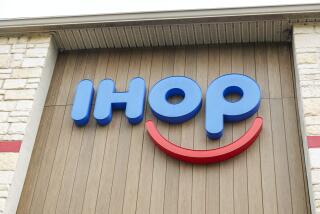IHOP Refuses to Go Flat as a Pancake : Short Sellers Have Been Betting Against the Glendale Chain to No Avail for Two Years
- Share via
IHOP Corp. wishes some of the most loyal fans of its International House of Pancakes restaurants would go away.
They are short sellers, bearish investors who profit when a stock goes down in price. And they have been betting against IHOP ever since the Glendale-based franchiser went public two years ago at $10 a share.
Today, IHOP’s stock fetches more than twice that. It closed Tuesday at $26.50 a share, up 37.5 cents, in NASDAQ trading.
About 9% of IHOP’s 9 million shares are currently held by short sellers, and the figure has remained “remarkably consistent” since the company’s July, 1991, initial public offering, said Frederick G. Silny, IHOP’s chief financial officer.
Part of the shorts’ reasoning seems to be that much of the company’s revenue comes from franchising fees, which they believe will eventually slow. Payments from franchisees--including onetime start-up fees and ongoing rents and royalties--accounted for 65% of IHOP’s $114 million in revenue last year.
Most analysts do not consider short interest alone a reliable measure of investor sentiment. But it is curious that IHOP continues to be a favorite with the shorts, even as the company’s sales and earnings keep stacking up new records.
IHOP’s first-quarter profit jumped 48% to $1.4 million, on a 24% increase in revenue to $30.2 million. Analysts expect full-year profit and revenue for 1993 to far surpass records set in 1992. Estimates are that annual profit will reach $12 million, up 53% from $7.9 million last year, and that revenue will grow 22% to $138 million.
The recession hasn’t hurt pancake sales: In IHOP restaurants that have been open for at least one year, revenue increased 4% in the first quarter and rose nearly 8% in 1992. The yearly figure was better than twice the restaurant industry’s average.
IHOP Chief Executive Richard (Kim) Herzer, a 63-year-old finance man who has been with the company 25 years, said he refuses to let the persistent short interest in the stock get him down. “Sure it bothers me that anybody would bet against us, but I’ve gotten used to it. We’ve come so far so fast that some people just don’t believe we’re for real yet.”
Short sellers work by borrowing shares of a stock, which they sell immediately, while agreeing to return those borrowed shares later in the hope they can repurchase them at a lower price. If the stock declines, short sellers buy the shares back--known as “covering” a short position--return them to the lender and pocket the difference.
Shorts don’t have to cover their positions within any certain period. Shares that have been sold short, but not yet repurchased, constitute what is known as a stock’s short interest. IHOP’s short interest in the four weeks ending May 15 was 783,128 shares.
Although a substantial short position in a stock reflects heavy speculation that its price will tumble, some investors consider an increase in short interest bullish. The reason: Sooner or later, the borrowed shares must be bought back.
Herzer believes that some of the investors who shorted IHOP at the initial public offering two years ago have not covered their original positions, even though they are now out more than a dollar for every dollar they invested--at least on paper--if they shorted IHOP close to the $10-a-share offering price. Since IHOP doesn’t pay any dividends--which short sellers normally must give up--”it isn’t costing them anything to carry their positions,” he said.
Herzer contends that some shorts don’t understand the company’s unusual franchising approach, which is to develop new restaurants itself and then sell them as already-operating businesses.
He believes the strategy will continue to attract franchisees and help the company sustain its growth rate. A franchise buyer’s onetime start-up fees can range from $50,000 to $600,000, depending on the restaurant’s projected sales, Herzer said.
Some analysts have criticized IHOP’s treatment of this income on its books. Even though the company often finances as much as 80% of a franchise buyer’s start-up fee for five years, it counts the entire amount as income as soon as it sells the franchise.
“Does this mean we’re capable of beefing up our income by scheduling new restaurant openings? Sure, but we also charge all of our direct costs like construction, development and overhead against those fees” at the same time IHOP receives its start-up franchise fee, Herzer said.
The accounting practice is standard, said Becky Barfield, an analyst who follows IHOP for the brokerage firm First Boston.
“The company certainly doesn’t try to hide anything,” she said.
Nearly 90% of the current 550 IHOP restaurants in the United States, Canada and Japan are operated by franchisees, who also buy ingredients and supplies from IHOP.
IHOP plans to open another 57 restaurants this year and is moving to replace its old familiar A-frames with larger, more attractive dining rooms aimed at boosting its lunch and dinner trade.
More to Read
Inside the business of entertainment
The Wide Shot brings you news, analysis and insights on everything from streaming wars to production — and what it all means for the future.
You may occasionally receive promotional content from the Los Angeles Times.










